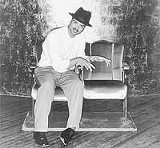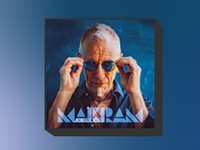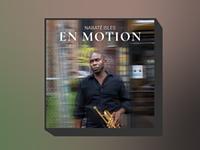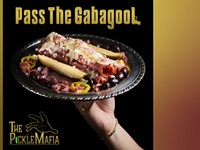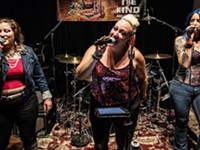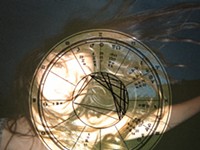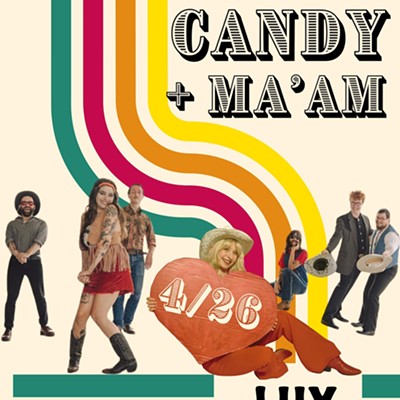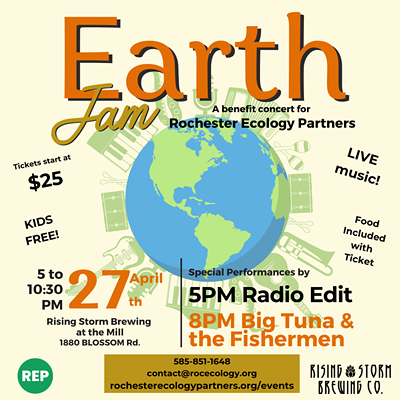[
{
"name": "500x250 Ad",
"insertPoint": "5",
"component": "15667920",
"parentWrapperClass": "",
"requiredCountToDisplay": "1"
}
]
With dazzling technique and an adventurous spirit that takes his music in uncharted directions, Jason Moran is not content to let jazz stand still. The 27-year-old has recorded three Blue Note albums, the latest of which, Black Stars, was named best jazz recording of 2001 by The New York Times.
On Thursday evening, May 9, Moran will be the featured artist in the fourth annual Marian McPartland/Eastman Jazz Series. While Moran might seem an uncharacteristically avant-garde choice, McPartland does not find the selection at all unusual.
“He’s a tremendously talented young player who seems to be able to do anything he’s thinking and he has a great sense of harmony,” she says.
McPartland may be more than a half-century older than Moran, but her own spirit of adventure knows no bounds. Having recorded dozens of excellent albums since her debut in 1947, McPartland sounds as vital as ever on her latest, Ain’t Misbehavin’: Live at the Jazz Showcase, a duet with Willie Pickens. And amid the solos, duos, and dialogue at the Eastman concert, she’s looking forward to playing some free-improvised jazz with Moran.
“Getting to play a free piece with somebody always gives me an indication of how versatile they are because you start from scratch,” she says. “He may start it or I may. You can kind of go with what you hear the other person do or you can lash out and go in the opposite direction.”
Moran has already engaged in some dueling pianos with McPartland as a guest on her long-running National Public Radio show, Piano Jazz.
“It was excellent,” he says. “She’s one of the few people who can really go a lot of places. The show is an icon of great radio. I was glad to be a part of it.”
Moran, who will also play at the Rochester International Jazz Festival with Greg Osby, first became aware of his keyboard prowess at the age of 14.
“I was failing an English class,” he says. “My father made me feel better by saying ‘None of the kids in that English class can play Thelonious Monk like you.’ I never forgot that.”
He grew up listening his father’s jazz records. But they were not his main influence. What was?
“Rap music,” Moran says. “The other stuff kind of prepared me technically for things that I do, but as far as feeling, emotion, and emphasis on rhythm, it was more the rap music that I listened to --- Public Enemy, Big Daddy Kane --- the golden years of rap, between 1987 and 1993. There were so many different groups doing so many varied styles of music, almost similar to what some people consider the golden age of jazz in the 1950s and 1960s.”
If that sounds like a stretch, Moran can be more specific.
“There are sections in classical music they call ostinatos, where a bass line or some figure is repeated over and over,” he says. “For me, instead of an ostinato, I think of it as a sample. I think of ways to sample myself and I actually do it on my next record. I think of a solo as the lyrical verses that a rapper performs. Also, I’m thinking about grooves a lot of the time.”
He obviously does not agree with jazz writer Stanley Crouch, who disdains rap music.
“I know Stanley very well and I like him, but that’s not his music,” Moran says. “It’s my generation’s music, so he can have that opinion. I love it, though it’s not as creative as it used to be.”
Still, Moran has no plans to join other jazz artists by collaborating with rappers on his recordings.
“I’m not ready for that. I don’t want somebody to just get up there and rap over my songs. I want it to be a collaboration of an idea and a composition,” he says. “I haven’t been a fan of any of them that have come out because they’ve been by people who weren’t really a part of that scene.”
Meanwhile, Moran has recorded and toured with Cassandra Wilson, Steve Coleman, Stefon Harris, and others, but he is especially thrilled to have saxophonist Sam Rivers on his latest album.
His respect for Rivers dates back to his first encounters with jazz. He came upon some live Rivers recordings and was especially impressed by Rivers’ ability to move from piano to saxophone to flute.
“The first piece on Black Stars is the first piece we recorded. There’s a moment in there where I’m not playing at all and I said to myself, ‘I can’t believe this is going to be on my record,’ literally, while the take was being made.”
The title, Black Stars, is a tribute.
“I was thinking of Sam Rivers or Andrew Hill, people in the African-American community who won’t get all the stardom that a Michael Jackson or a Winton Marsalis get, but are equally important to people, without them actually even knowing it,” Moran says. “So these stars are shining in the sky but they’re not the stars you always see, like the Big Dipper or the North Star, these are the ones in the background.”
Moran feels lucky to have studied with another “Black star,” the late pianist Jaki Byard.
“You watch him perform a stride piece, but then he inflects all this modern and contemporary sound into it so it doesn’t sound old-timey anymore. Just watching him adapt various styles of music into one piece was really inspiring.” Moran will discuss Byard’s legacy in a talk Thursday afternoon.
One thing Moran inherited from Byard was a sense of unpredictability. His three CDs contain a mix of original compositions, lesser-known Duke Ellington tunes, and some real left-field choices, like “Murder of Don Fanucci.”
As a fan of The Godfather, Moran had heard the piece over and over. Every time that section of the movie came up he found himself admiring the tune. Finally, he decided to transcribe it. He brought it to his band and it became part of the repertoire.
When asked to describe his style, Moran hesitates.
“I’m not even sure what it is,” he says. “I just know that it’s music that’s evolving while it’s being performed. It moves in ways where we really don’t know what’s going to happen. You can’t anticipate the next move.”
Moran’s influences are not restricted to musicians. On his first album is a tune titled “JAMO Meets SAMO,” a tribute to painter Jean-Michel Basquiat. Basquiat has qualities as an artist that he’d like to emulate as a musician.
“He’s pretty raw. There’s something about an artist really being raw, like having true emotion emitted at all times.”
Jason Moran will play in the Marian McPartland/Eastman Jazz Series at 8 p.m. on Thursday, May 9, in Kilbourn Hall, 26 Gibbs St. Reserved tickets, from $5-$15, are available in advance at Ticket Express, 100 East Avenue, or by calling 222-5000. Moran presents a jazz lecture-workshop at 1 p.m. on Thursday, May 9, in Kilbourn Hall (free). Celebrating Marian at Eastman, an exhibit honoring McPartland, runs from May 9 to September 15 in the Sibley Music Library.
On Thursday evening, May 9, Moran will be the featured artist in the fourth annual Marian McPartland/Eastman Jazz Series. While Moran might seem an uncharacteristically avant-garde choice, McPartland does not find the selection at all unusual.
“He’s a tremendously talented young player who seems to be able to do anything he’s thinking and he has a great sense of harmony,” she says.
McPartland may be more than a half-century older than Moran, but her own spirit of adventure knows no bounds. Having recorded dozens of excellent albums since her debut in 1947, McPartland sounds as vital as ever on her latest, Ain’t Misbehavin’: Live at the Jazz Showcase, a duet with Willie Pickens. And amid the solos, duos, and dialogue at the Eastman concert, she’s looking forward to playing some free-improvised jazz with Moran.
“Getting to play a free piece with somebody always gives me an indication of how versatile they are because you start from scratch,” she says. “He may start it or I may. You can kind of go with what you hear the other person do or you can lash out and go in the opposite direction.”
Moran has already engaged in some dueling pianos with McPartland as a guest on her long-running National Public Radio show, Piano Jazz.
“It was excellent,” he says. “She’s one of the few people who can really go a lot of places. The show is an icon of great radio. I was glad to be a part of it.”
Moran, who will also play at the Rochester International Jazz Festival with Greg Osby, first became aware of his keyboard prowess at the age of 14.
“I was failing an English class,” he says. “My father made me feel better by saying ‘None of the kids in that English class can play Thelonious Monk like you.’ I never forgot that.”
He grew up listening his father’s jazz records. But they were not his main influence. What was?
“Rap music,” Moran says. “The other stuff kind of prepared me technically for things that I do, but as far as feeling, emotion, and emphasis on rhythm, it was more the rap music that I listened to --- Public Enemy, Big Daddy Kane --- the golden years of rap, between 1987 and 1993. There were so many different groups doing so many varied styles of music, almost similar to what some people consider the golden age of jazz in the 1950s and 1960s.”
If that sounds like a stretch, Moran can be more specific.
“There are sections in classical music they call ostinatos, where a bass line or some figure is repeated over and over,” he says. “For me, instead of an ostinato, I think of it as a sample. I think of ways to sample myself and I actually do it on my next record. I think of a solo as the lyrical verses that a rapper performs. Also, I’m thinking about grooves a lot of the time.”
He obviously does not agree with jazz writer Stanley Crouch, who disdains rap music.
“I know Stanley very well and I like him, but that’s not his music,” Moran says. “It’s my generation’s music, so he can have that opinion. I love it, though it’s not as creative as it used to be.”
Still, Moran has no plans to join other jazz artists by collaborating with rappers on his recordings.
“I’m not ready for that. I don’t want somebody to just get up there and rap over my songs. I want it to be a collaboration of an idea and a composition,” he says. “I haven’t been a fan of any of them that have come out because they’ve been by people who weren’t really a part of that scene.”
Meanwhile, Moran has recorded and toured with Cassandra Wilson, Steve Coleman, Stefon Harris, and others, but he is especially thrilled to have saxophonist Sam Rivers on his latest album.
His respect for Rivers dates back to his first encounters with jazz. He came upon some live Rivers recordings and was especially impressed by Rivers’ ability to move from piano to saxophone to flute.
“The first piece on Black Stars is the first piece we recorded. There’s a moment in there where I’m not playing at all and I said to myself, ‘I can’t believe this is going to be on my record,’ literally, while the take was being made.”
The title, Black Stars, is a tribute.
“I was thinking of Sam Rivers or Andrew Hill, people in the African-American community who won’t get all the stardom that a Michael Jackson or a Winton Marsalis get, but are equally important to people, without them actually even knowing it,” Moran says. “So these stars are shining in the sky but they’re not the stars you always see, like the Big Dipper or the North Star, these are the ones in the background.”
Moran feels lucky to have studied with another “Black star,” the late pianist Jaki Byard.
“You watch him perform a stride piece, but then he inflects all this modern and contemporary sound into it so it doesn’t sound old-timey anymore. Just watching him adapt various styles of music into one piece was really inspiring.” Moran will discuss Byard’s legacy in a talk Thursday afternoon.
One thing Moran inherited from Byard was a sense of unpredictability. His three CDs contain a mix of original compositions, lesser-known Duke Ellington tunes, and some real left-field choices, like “Murder of Don Fanucci.”
As a fan of The Godfather, Moran had heard the piece over and over. Every time that section of the movie came up he found himself admiring the tune. Finally, he decided to transcribe it. He brought it to his band and it became part of the repertoire.
When asked to describe his style, Moran hesitates.
“I’m not even sure what it is,” he says. “I just know that it’s music that’s evolving while it’s being performed. It moves in ways where we really don’t know what’s going to happen. You can’t anticipate the next move.”
Moran’s influences are not restricted to musicians. On his first album is a tune titled “JAMO Meets SAMO,” a tribute to painter Jean-Michel Basquiat. Basquiat has qualities as an artist that he’d like to emulate as a musician.
“He’s pretty raw. There’s something about an artist really being raw, like having true emotion emitted at all times.”
Jason Moran will play in the Marian McPartland/Eastman Jazz Series at 8 p.m. on Thursday, May 9, in Kilbourn Hall, 26 Gibbs St. Reserved tickets, from $5-$15, are available in advance at Ticket Express, 100 East Avenue, or by calling 222-5000. Moran presents a jazz lecture-workshop at 1 p.m. on Thursday, May 9, in Kilbourn Hall (free). Celebrating Marian at Eastman, an exhibit honoring McPartland, runs from May 9 to September 15 in the Sibley Music Library.
Speaking of...
Latest in Music Features
More by Ron Netsky
-
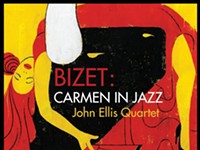
Album Review | 'Bizet: Carmen in Jazz'
Mar 26, 2024 -
'To Swing Is the Thing" by Mike Melito
Aug 10, 2023 - More »
